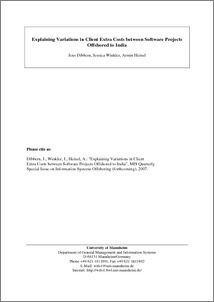|
Explaining Variations in Client Extra Costs between Software Projects Offshored to India
Dibbern, Jens
;
Winkler, Jessica
;
Heinzl, Armin
![[img]](https://madoc.bib.uni-mannheim.de/1815/1.hassmallThumbnailVersion/Working_Paper_8_2007_aktualisiert.pdf)  Vorschau |
|
PDF
Working_Paper_8_2007_aktualisiert.pdf
- Veröffentlichte Version
Download (279kB)
|
|
URL:
|
https://ub-madoc.bib.uni-mannheim.de/1815
|
|
URN:
|
urn:nbn:de:bsz:180-madoc-18159
|
|
Dokumenttyp:
|
Arbeitspapier
|
|
Erscheinungsjahr:
|
2007
|
|
Titel einer Zeitschrift oder einer Reihe:
|
None
|
|
Sprache der Veröffentlichung:
|
Englisch
|
|
Einrichtung:
|
Fakultät für Betriebswirtschaftslehre > Sonstige - Fakultät für Betriebswirtschaftslehre
|
|
MADOC-Schriftenreihe:
|
Area Information Systems and Institute for Enterprise Systems > Working Papers Lehrstuhl für ABWL und Wirtschaftsinformatik (Heinzl) (bis 2011)
|
|
Fachgebiet:
|
004 Informatik
|
|
Normierte Schlagwörter (SWD):
|
Offshoring , Outsourcing , Softwareentwicklung , Indien
|
|
Freie Schlagwörter (Englisch):
|
Offshoring , outsourcing , software application services , transaction cost economics , knowledgebased view , absorptive capacity
|
|
Abstract:
|
Gaining economic benefits from substantially lower labor costs has been reported as a major reason for offshoring labor-intensive information systems (IS) services to low-wage countries; however, if wage differences are so high, why is there such a high level of variation in the economic success between offshored IS projects? This study argues that offshore outsourcing involves a number of extra costs for the client organization that account for the economic failure of offshore projects. The objective is to disaggregate these extra costs into its constituent parts and to explain why they differ between offshored software projects. The focus is set on software development and maintenance projects that are offshored to Indian vendors. A theoretical framework is developed a priori based on transaction cost economics (TCE) and the knowledge-based view of the firm, complemented by factors that acknowledge the specific offshore context. The framework is empirically explored using a multiple case study design including six offshored software projects in a large German Financial Service institution. The results of our analysis indicate that the client incurs post contractual extra costs for four types of activities: (1) requirements specification and design, (2) knowledge transfer, (3) control, and (4) coordination. In projects that require a high level of client-specific knowledge about idiosyncratic business processes and software systems, these extra costs were found to be substantially higher than in projects were more general knowledge was needed. Notably, these costs most often arose independently from the threat of opportunistic behavior, challenging the predominant TCE logic of market failure. Rather, the client extra costs were particularly high in client-specific projects because the effort for managing the consequences of the knowledge asymmetries between client and vendor were particularly high in these projects. Prior experiences of the vendor with related client projects were found to reduce the level of extra costs but could not fully offset the increase in extra costs in highly client-specific projects. Moreover, cultural and geographic distance between client and vendor as well as personnel turnover were found to increase client extra costs. Slight evidence was found, however, that the cost increasing impact of these factors was also leveraged in projects with a high level of required client-specific knowledge (moderator effect).
|
|
Zusätzliche Informationen:
|
Please cite as:
Dibbern, J., Winkler, J., Heinzl, A.: "Explaining Variations in Client Extra Costs between Software Projects Offshored to India", MIS Quarterly Special Issue on Information Systems Offshoring (forthcoming), 2007.
|
 | Das Dokument wird vom Publikationsserver der Universitätsbibliothek Mannheim bereitgestellt. |
 Suche Autoren in Suche Autoren in
Sie haben einen Fehler gefunden? Teilen Sie uns Ihren Korrekturwunsch bitte hier mit: E-Mail
Actions (login required)
 |
Eintrag anzeigen |
|
|



 Suche Autoren in
Suche Autoren in